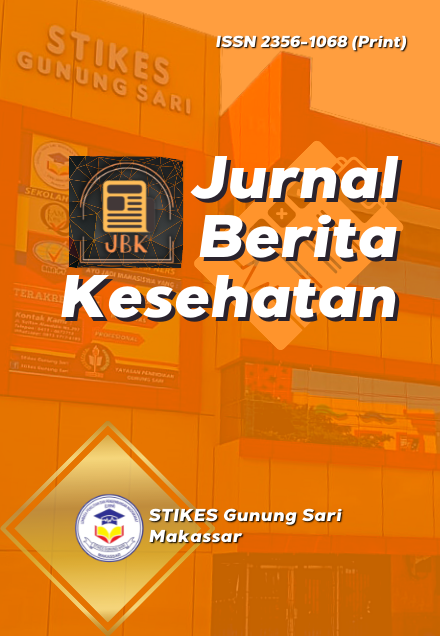THE RELATIONSHIP OF FAMILY KNOWLEDGE AND SUPPORT WITH SELF EFFICACY OF BREASTFEEDING IN PRIMIPARA MOTHERS IN THE WORK AREA OF MAMAJANG PUSKESMAS, MAKASSAR CITY
DOI:
https://doi.org/10.58294/jbk.v14i2.83Keywords:
knowledge, family support, breasfeeding self efficacyAbstract
Self Efficacy of breastfeeding Mothers is one of the important factors that influence breastfeeding. Breastfeeding is an unparalleled way of providing the ideal food for healthy growth and development, and the health of mothers and babies can strengthen the inner bond between mother and baby. This study aims to examine the relationship Knowledge and family Support With Self Efficacy Breastfeeding On Ibu Primipara in the Working Area of Mamajang Health Center Makassar This type of research is descriptive analytic research with Cross sectional study approach. Population referred to in this study were all postpartum primipara women who have given birth in the birth room mamajang a number of 68 people, obtained 41 respondents samples with Technique of Sampling Non Probability Sampling is Accidental Sampling. The results show after bivariate analysis from Chi-Square test obtained p (0,000) < α (0,05) hence hypothesis conclusion no rejected and alternative hypothesis accepted that there is relation knowledge with Self Efficacy suckle. Results of research can be seen from Chi-Square test results obtained p (0,001) < α (0,05) hence hypothesis conclusion no rejected and alternative hypothesis accepted that there is relation of family support with Self Efficacy breastfeeding. From the results of research is expected for the community, especially families in providing support, in the family especially husband, parents help mothers to be able to breastfeed comfortably so that the milk produced maximum.
References
Bandura, A., & Watts, R. E. (1996). Self-efficacy in changing societies
Dennis, C. L. (2003). The breastfeeding self‐fficacy scale: Psychometric assessment of the short form. Journal of Obstetric, Gynecologic, & Neonatal Nursing, 32(6), 734-744.
Guil, M., & Pollard, D. (2009). The Relationship between Baseline Sel-Efficacy and Breastfeeding Duration. Southern Online Journal of Nursing Research, 9(4), 499-450.
Indonesia, P. R. (2012). Peraturan Pemerintah Republik Indonesia nomor 33 tahun 2012 tentang pemberian air susu ibu eksklusif
Kemenkes, R. I. (2015). Profil kesehatan Indonesia tahun 2014. Jakarta: kemenkes RI, 2015.
Notoadmodjo, S. (2012). Ilmu Perilaku Kesehatan. Jakarta:PT.Rineka Cipta.
Riset Kesehatan Dasar (Riskesdas) (2014). Badan Penelitian dan Pengembangan Kesehatan Kementerian Kesehatan: Jakarta.
Suharjo & Kusharto, C. (2010). Prinsip-prinsip Ilmu Gizi.
Sul-Sel, D. (2014). Profil Kesehatan Provinsi Sulawesi Selatan Tahun 2014. Makassar: Dinas Kesehatan Sulawesi Selatan.
Roesli, U. (2009). Seri 1 Mengenal ASI Eksklusif. Jakarta: Trubus Agriwidya.
World Health Organization. (2014). Global nutrition targets 2025: breastfeeding policy brief (No. WHO/NMH/NHD/14.7). World Health Organization.
WHO. (2014). The Optimal Duration of Exclusive Breastfeeding. Report of an Expert Counsultation.
Downloads
Published
How to Cite
Issue
Section
License
Copyright (c) 2022 Andi Tenri Abeng, Andi Wahyuni

This work is licensed under a Creative Commons Attribution 4.0 International License.
Hak Cipta dan Lisensi
Dengan mengirimkan naskah artikel, berarti penulis setuju dengan segala kebijakan yang ditetapkan oleh jurnal dan penerbit.
Penulis menyatakan bahwa:
- kebijakan ini telah diketahui dan disetujui bersama oleh semua penulis;
- naskah artikel belum dipublikasikan secara resmi sebelumnya di media ber-ISSN atau ber-ISBN yang terdaftar, kecuali dalam bentuk abstrak atau sebagai bagian dari materi kuliah, atau skripsi/tesis/disertasi yang tidak diterbitkan;
- naskah tidak sedang dalam proses editorial dan dipertimbangkan untuk publikasi di tempat lain;
- publikasi naskah ini telah disetujui oleh semua penulis, institusi afiliasi penulis, otoritas yang bertanggung jawab, dan lembaga di mana kegiatan telah dilakukan;
- naskah berisi materi yang aman dari pelanggaran hak cipta;
Perjanjian Hak Cipta dan Lisensi
- Penulis memiliki hak cipta dan hak kepemilikan lainnya yang terkait dengan artikel.
- Penulis memiliki hak dan diizinkan untuk menggunakan substansi artikel untuk karya-karya penulis berikutnya, termasuk untuk keperluan bahan/materi kuliah dan buku.
- Penulis menyerahkan hak publikasi pertama kepada jurnal dengan di bawah Lisensi Creative Commons (CC BY 4.0).
Pernyataan Lisensi Creative Commons CC BY 4.0
Anda diperbolehkan:
- Berbagi — menyalin dan menyebarluaskan kembali materi ini dalam bentuk atau format apapun;
- Adaptasi — menggubah, mengubah, dan membuat turunan dari materi ini untuk kepentingan apapun, termasuk kepentingan komersial.
Pemberi lisensi tidak dapat mencabut ketentuan di atas sepanjang Anda mematuhi ketentuan lisensi berikut ini.
- Atribusi — Anda harus mencantumkan nama yang sesuai, mencantumkan tautan terhadap lisensi, dan menyatakan bahwa telah ada perubahan yang dilakukan. Anda dapat melakukan hal ini dengan cara yang sesuai, namun tidak mengisyaratkan bahwa pemberi lisensi mendukung Anda atau penggunaan Anda.
- Tidak ada pembatasan tambahan — Anda tidak dapat menggunakan ketentuan hukum atau sarana kontrol teknologi yang secara hukum membatasi orang lain untuk melakukan hal-hal yang diizinkan lisensi ini.









